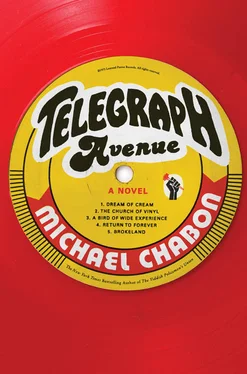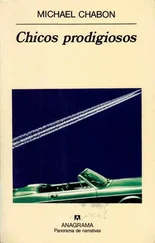1 ...6 7 8 10 11 12 ...118 “Gibson Goode was born here,” Singletary continued when no explanation was forthcoming from either partner.
Singletary was in his mid-fifties but looked thirty. Hair sprang carefully from his head in micro-dreads no thicker than his grandson’s fingers. His smile easy and warm, his eyes as cold as pennies at the bottom of a well. Like Fifty-Eight’s, those eyes missed nothing, cloaking in a universal fog of conversation the ceaseless void of his surveillance. Archy wondered if the man’s unease around the bird arose from recognition of a rival or a peer.
Singletary said, “Man grew up down in L.A., but his granny still living over in Rumford Plaza. Y’all was operating in Atlanta, New York, and this dude showed up in his great big black blimp, I might understand how you could feel some resentfulness. But Gibson Goode is a semi-local product. Like”—the eyes teaming up with the smile to give notice that he was about to mess with Nat—“if you was to put you and Archy together. Half local, half out of town.”
“Half and half,” Nat said, humming to himself, pouring the formula into Rolando English. The boy definitely had an appetite; they had run through the bottles of Good Start by eleven this morning and were working on a can of Enfamil powder mixed with water at Brokeland’s bathroom sink, the Enfamil provided by S. S. Mirchandani from a deep, remote, and spidery shelf over at Temescal Liquor, which he owned. The infant carrier came courtesy of the King of Bling.
“Look at him go.” Cochise Jones watched the baby formula work its way like mercury in a falling thermometer down the graduations. Intent, pleased, doubtful, as if he had money riding on the outcome. He winked at Archy. Mr. and the late Mrs. Jones never had children of their own. “Boy making me thirsty.”
“Yes, I am feeling quite thirsty myself,” said Mr. Mirchandani, and Archy felt a flutter of anticipatory dread. “You know, Nat, you really should put in an espresso machine or other form of beverage service.”
Archy plunged himself deeper into the mysteries of crate number 8. The theoretical espresso machine was a sore subject, the most recent of many arguments between the co-owners of Brokeland having begun over the question of whether, as Archy had been hinting with increasing heavy-handedness for a couple of years, the time had come to offer more at the counter than unlimited supplies of music and bullshit on tap. Because the truth was, they were already fucked, with or without Gibson Goode and his Dogpile empire. They were behind on the rent to Singletary. Their inventory was dwindling as their ability to purchase the better collections ran afoul of cash flow problems. Probably if you looked at the matter coolly and rationally, an activity in which neither partner could be said to excel, they were on their last legs. So many of the other used-record kings of the East Bay had already gone under, hung it up, or turned themselves into Internet-only operations, closing their doors, letting the taps of bullshit go dry. Brokeland Records was nearly the last of its kind, Ishi, Chingachgook, Martha the passenger pigeon.
Every time Archy broached the subject of trying some new angle, branching out, beefing up their website, even, yes, selling coffee drinks and pastries and chai, he ran into heavy resistance from Nat. Not just resistance; the man would shut down the conversation, shut himself down, with that infuriating, self-righteous Abraham the Patriarch way he had sometimes, acting as if he and Archy were not a couple of secondary-market retailers trying to stay afloat but guardians of some ancient greatness that must never be tainted or altered. When really (like any religion, Archy supposed), it was a compound of OCD and existential panic, a displaced fear of change. Reroutings of familiar traffic patterns, new watermarks and doodads on the national currency, revised rules for the bundling of recyclables, such things were anathema to Nat Jaffe. Fresh starts, clean slates, reboots: anathema. He stood against them like an island in the flow, a snag of branches.
“You want a fucking macchiato?” he had said a couple of days earlier, throwing a record album at Archy, nothing too valuable, just a copy of Stan Getz and J. J. Johnson at the Opera House (Verve, 1957), Getz sitting in with Johnson, Oscar Peterson, Ray Brown, and Connie Kay. “Here’s your fucking macchiato!”
Meaning, sweet light froth of a white guy on top of a dense dark bottom of black. The shot had gone wide, but damn, a flying record, the thing could have sliced Archy’s head off. Archy found himself annoyed just thinking about it now. It annoyed him as well that Mr. Mirchandani had mentioned the espresso machine, even though he knew that Mr. Mirchandani was only trying to help out, take up the cause, join the chorus of those who did not want to see Brokeland die. There was no mistaking the fact that Nat was on high simmer today, perhaps two bubbles away from a full-on roll.
“Gentlemen.”
It was a mild voice, the voice of a man trained to extol the highest in men and women while seeing them at their lowest. Trained to seemliness, to keeping itself soft and low under the pall of remembrance and grief that forever hung over Flowers & Sons. At the sound of that funereal voice, its head cocked in Singletary’s direction, the African grey parrot began to give out, note-perfect, Cochise Jones’s reading of the old Mahalia Jackson spiritual “Trouble of the World,” found on Mr. Jones’s only album as a bandleader, Redbonin’ (CTI, 1973).
“Look out,” Mr. Jones said, but as usual, Fifty-Eight was way ahead of him.
In the shade of a wide-brimmed black hat whose vibe wavered between crime boss and Henry Fonda in Once upon a Time in the West , pin-striped gray-on-charcoal three-piece, black wing tips shined till they shed a perceptible halo, Chan Flowers came into the store. Slid himself through the front door, ineluctable as a final notice from the county. Straight-backed, barrel-chested, bowlegged. A model of probity, a steady hand to reassure the grieving, a sober man—a grave man—solid as the pillar of a tomb. A good dose of gangster to the hat to let you know the councilman played his politics old-school, with a shovel in the dark of the moon. Plus that touch of Tombstone, of Gothic western undertaker, like maybe sometimes when the moon was full and Flowers & Sons stood empty and dark but for the vigil lights, Chan Flowers might up and straddle a coffin, ride it like a bronco.
“Looks like we have ourselves the hard core here today,” he said, quickly tallying the faces at the counter before settling on Archy, a question in his eyes, something he wanted to know. “Wait out here,” he told his nephews.
The two Flowers nephews stayed out on the sidewalk. Like all of Mr. Flowers’s younger crop of nephews, they seemed not to be wearing their ill-fitting black suits so much as to be squatting inside them until some less embarrassing habitation came along. They had the solemn faces of practical jokers waiting to spring a gag. One of them took out a book of Japanese math puzzles and started working them with a stub of pencil.
“Mr. Jones!” Flowers said, starting in, with that politician resolve, to fill the boxes of this human sudoku.
“Your Honor,” said Cochise Jones.
Flowers reached for Mr. Jones’s octave-and-a-half hand, its nails like chips of piano ivory.
“The honor is indeed mine,” Flowers said, “as always, to bask in the reflected luster of the legacy you represent. Inventor of the musical styling known as Brokeland Creole.” Mr. Jones was also, as far as Archy knew, the first person to use the term Brokeland to describe this neighborhood, the ragged fault where the urban plates of Berkeley and Oakland subducted. “Hello, Fifty-Eight.”
Читать дальше
Конец ознакомительного отрывка
Купить книгу












